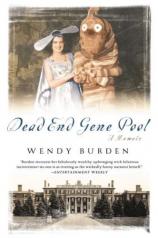Reading Group Guide
Discussion Questions
Dead End Gene Pool: A Memoir

1. Wendy exhibits a dark sense of humor. How do you think this affected her perception of the events of her childhood?
2. What do you think saved Wendy from the pitfalls that plagued her brothers and uncles?
3. Were either Wendy’s grandparents or her own mother adequate child custodians? Do you think the courts would have questioned their custody if the family hadn’t had so much money?
4. How could Wendy and Will’s mother and grandparents better handled explaining the suicide of their father to them?
5. Wendy writes, “rich people behaving badly are far more interesting than the not so rich behaving badly” (p. 5). Do you agree or disagree with this statement?
6. If the Horatio-Algeresque rise of Cornelius Vanderbilt embodies the fulfillment of the American dream, why is it so pleasurable to read about his heirs’ descent into decadence and failure?
7. There are a lot of stories about lottery winners and inheritors of great wealth either burning through their money, or winding up really unhappy. Why do you think unearned money is so often a curse?
8. How, if at all, does the wealth of Wendy’s grandparents affect your reading of their final years?
9. If you could ask Wendy one question left unanswered by her memoir, what would it be?
10. Dead End Gene Pool is both touching and funny. Would Wendy’s narrative have been as compassionate if she’d written it in her 20s or 30s?
11.Why does Wendy choose to end the book with the information she discovered about Charles Thomas, her mother’s former lover?
12. F. Scott Fitzgerald famously said, “The rich are different from you and I.” And Ernest Hemingway’s famously replied, “Yes, they have more money.” Whose statement do you find yourself in agreement with after reading Dead End Gene Pool?
Dead End Gene Pool: A Memoir
- Publication Date: March 1, 2011
- Paperback: 288 pages
- Publisher: Gotham
- ISBN-10: 1592406068
- ISBN-13: 9781592406067







